《中国人的精神》(英文版)]
中国人的精神
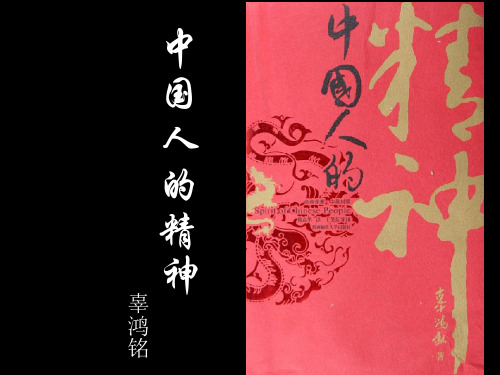
第六章 汉学,第一部分 (Chinese Scholarship, Part I)
第七章 汉学,第二部分 (Chinese Scholarship, Part II)
引言:Why author writing this book The great war at the present moment is absorbing all the attention of the world exclusive of
纵观人类历史,没有一个国家或民族
能够脱离外界而孤立地存在,它必定要在与
其他国家的不断交流中生存和发展。当不同民族精
神之河的洪流奔涌到一起的时候,它们必将相互碰
撞并不断汇合。十九世纪末的中国社会正是处于这
样一个中西文明冲撞交汇的特殊时期,不仅有西学
东渐的浪潮,也有东学西渐的暗流。
二十一世纪的中国亦是如此的境遇。面对外 来文化的汹涌潮水,中国传统文化本自新文化运动 被批判为落后的腐朽的象征,至今日以经济发展为导向的社
“我认为,欧洲人将在中国,在中国文明中找
到这种新的道德力量。这种能够使得军国主义成 为多余的道德力量就是好公民的宗教(The Religion of
Good-citizenship)…在中国,一个人通过他的邻居的正义
感而得到保护;他通过他的同类时刻服从道德义务感而得到 保护。确实,在中国,一个人不觉得需要用自然力量来保护 自己,因为他确信每个人都认识到公正和正义是比自然力量 更高的力量,因此每个人都认为道德义务是必需得到服从的
辜 鸿 铭
中 国 人 的 精 神
人类的一线光明,是中国的民主思想! ----卡莱尔
中国文明有宁静中和的精神,其人的生活以及文
艺器物之所表现者,皆光明而纯粹,健全而安宁。 中国人凡是均有节制,不行之过当,故能立国数千 年之久,他日亦不至灭亡赖有此耳。--------歌德 你们是亚洲的希望,全人类的希望!------泰戈尔
近代学人推介

文化殉道者——王国维
王国维
王国维,字静安,号观堂,浙江海宁盐官镇人。清 末秀才。我国近现代在文学、美学、史学、哲学、 古文字、考古学等各方面成就卓著的学术巨子, 国学大师。
主要作品:《静安文集》 《王国维遗书》 《王观堂先生全集》 《宋元戏曲考》 《曲录》 《人间词话》 《殷周制度论》
代表作品: 钱穆著述颇丰,专著多达80种以上。其代表作有 《先秦诸子系年》、《中国近三百年学术史》、《国史大 纲》、《中国文化史导论》、《文化学大义》、《中国历 代政治得失》、《中国历史精神》、《中国思想史》、 《宋明理学概述》、《中国学术通义》和《从中国历史来 看中国民族性及中国文化》等。此外还有结集出版论文集 多种,如《中国学术思想史论丛》、《中国文化丛谈》等。
文化界流传,1988年诺贝尔评审委员会已 经决定文学奖得奖者是沈从文,但因为诺 贝尔奖只会颁授给在世的人,因此沈从文 与诺贝尔文学奖可谓失之交臂。
“所谓大学者,非谓有大楼之谓也, 有大师之谓也。”
— —梅贻琦
大学的精神何在?大师何在?
“寅恪治史学,当然是今日最渊博、最有识 见、最能用材料的人。” ——胡适
清华国学院四大导师
任公、观堂、寅恪、元任
启蒙大师——梁启超
梁启超
字卓如,号任公,又号饮冰室主人 。广东新 会人,中国近代维新派代表人物,近代中 国的思想启蒙者。梁启超于学术研究涉猎 广泛,在哲学、文学、史学、经学、法学、 伦理学、宗教学等领域,均有建树,以史 学研究成绩最显著。
——鲁迅
国学狂人——黄侃
黄侃
黄侃:著名语言文字学家。广东顺德人。
名家评说
他的国学是数一数二的,可是他的脾气乖 僻,和他的学问成正比,说起有些事情来, 着实令人不敢恭维。
中国人的精神作文英文版
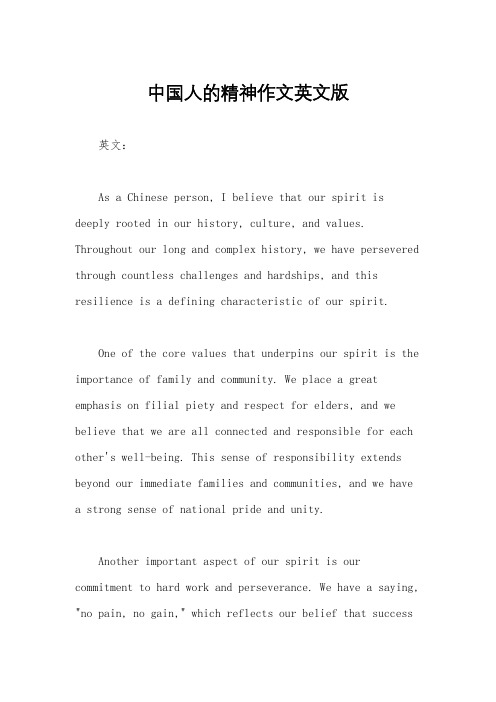
中国人的精神作文英文版英文:As a Chinese person, I believe that our spirit is deeply rooted in our history, culture, and values. Throughout our long and complex history, we have persevered through countless challenges and hardships, and this resilience is a defining characteristic of our spirit.One of the core values that underpins our spirit is the importance of family and community. We place a great emphasis on filial piety and respect for elders, and we believe that we are all connected and responsible for each other's well-being. This sense of responsibility extends beyond our immediate families and communities, and we have a strong sense of national pride and unity.Another important aspect of our spirit is our commitment to hard work and perseverance. We have a saying, "no pain, no gain," which reflects our belief that successrequires effort and sacrifice. We are willing to work tirelessly to achieve our goals, and we are not deterred by setbacks or failures.Finally, I believe that our spirit is characterized by a deep sense of humility and respect for others. We value harmony and cooperation, and we strive to maintain positive relationships with those around us. This is reflected in our cultural practices, such as the concept of "face," which emphasizes the importance of saving face for oneself and others.Overall, I am proud of the Chinese spirit and believe that it is a source of strength and resilience for our people.中文:作为一个中国人,我相信我们的精神深深扎根于我们的历史、文化和价值观中。
中国人的精神原文阅读
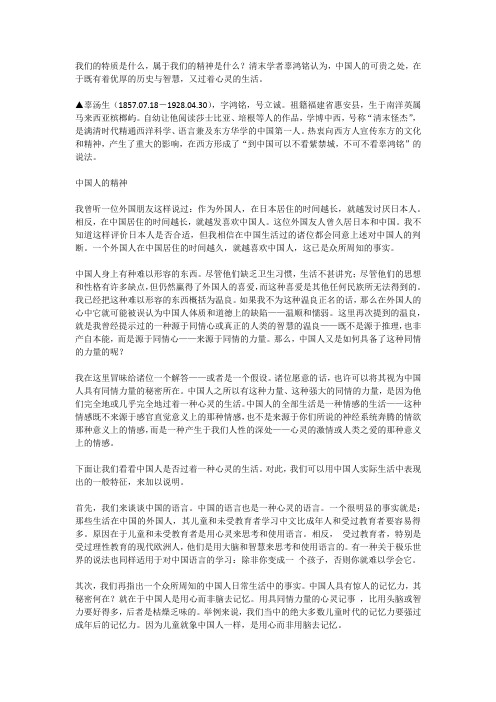
我们的特质是什么,属于我们的精神是什么?清末学者辜鸿铭认为,中国人的可贵之处,在于既有着优厚的历史与智慧,又过着心灵的生活。
▲辜汤生(1857.07.18-1928.04.30),字鸿铭,号立诚。
祖籍福建省惠安县,生于南洋英属马来西亚槟榔屿。
自幼让他阅读莎士比亚、培根等人的作品,学博中西,号称“清末怪杰”,是满清时代精通西洋科学、语言兼及东方华学的中国第一人。
热衷向西方人宣传东方的文化和精神,产生了重大的影响,在西方形成了“到中国可以不看紫禁城,不可不看辜鸿铭”的说法。
中国人的精神我曾听一位外国朋友这样说过:作为外国人,在日本居住的时间越长,就越发讨厌日本人。
相反,在中国居住的时间越长,就越发喜欢中国人。
这位外国友人曾久居日本和中国。
我不知道这样评价日本人是否合适,但我相信在中国生活过的诸位都会同意上述对中国人的判断。
一个外国人在中国居住的时间越久,就越喜欢中国人,这已是众所周知的事实。
中国人身上有种难以形容的东西。
尽管他们缺乏卫生习惯,生活不甚讲究;尽管他们的思想和性格有许多缺点,但仍然赢得了外国人的喜爱,而这种喜爱是其他任何民族所无法得到的。
我已经把这种难以形容的东西概括为温良。
如果我不为这种温良正名的话,那么在外国人的心中它就可能被误认为中国人体质和道德上的缺陷——温顺和懦弱。
这里再次提到的温良,就是我曾经提示过的一种源于同情心或真正的人类的智慧的温良——既不是源于推理,也非产自本能,而是源于同情心——来源于同情的力量。
那么,中国人又是如何具备了这种同情的力量的呢?我在这里冒昧给诸位一个解答——或者是一个假设。
诸位愿意的话,也许可以将其视为中国人具有同情力量的秘密所在。
中国人之所以有这种力量、这种强大的同情的力量,是因为他们完全地或几乎完全地过着一种心灵的生活。
中国人的全部生活是一种情感的生活——这种情感既不来源于感官直觉意义上的那种情感,也不是来源于你们所说的神经系统奔腾的情欲那种意义上的情感,而是一种产生于我们人性的深处——心灵的激情或人类之爱的那种意义上的情感。
辜鸿铭《中国人的精神》(英文版)
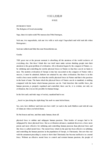
中国人的精神辜鸿铭INTRODUCTIONThe Religion of Good-citizenshipSage, thun ivir nicht rechtl Wir mussen den Pobel betrugen,Scih nur, ivie ungeschickt, sich nur ivie wild er sich zeigt\ Ungeschick und wild sind alle rohen Betrogenen ;Seid nur redlich und fiihrt ihn zum Menschlichen an.GoetheTHE great war at the present moment is absorbing all the attention of the world exclusive of everything else. But then I think this war itself must make serious thinking people turn their attention to the great problem of civilisation. All civilisation begins by the conquest of Nature, i.e. by subduing and controlling the terrific physical forces in Nature so that they can do no harm to men. The modern civilisation of Europe to-day has succeeded in the conquest of Nature with a success, it must be admitted, hitherto not attained by any other civilisation. But there is in this world a force more terrible even than the terrific physical forces in Nature and that is the passions in the heart of man. The harm which the physical forces of Nature can do to mankind, is nothing compared with the harm which human passions can do. Until therefore this terrible force,_the human passions_is properly regulated and controlled, there can be, it is evident, not only no civilisation, but even no life possible for human beings.In the first early and rude stage of society, mankind had to use_ Aren't we just doing the right thing? the mob we must befool them;See, now, how shiftless! and look now how wild! {or such is the mob-Shiftless and wild all sons of Adam are when you befool them;Be but honest and true, and thus make human, them all.physical force to subdue and subjugate human passions. Thus hordes of savages had to be subjugated by sheer physical force. But as civilisation advances, mankind discovers a force more potent and more effective for subduing and controlling human passions than physical force and this force is called moral force. The moral force which in the past has been effective in subduing and controlling the human passions in the population of Europe, is Christianity. But now this war with the armament preceding it, seems to show that Christianity has become ineffective as a moral force. Without an effective moral force to control and restrain human passions, the people ofEurope have had again to employ physical force to keep civil order. As Car-lyle truly says, " Europe is Anarchy plus a constable. " The use of physical force to maintain civil order leads to militarism. In fact militarism is necessary in Europe to-day because of the want of an effective moral force. But militarism leads to war and war means destruction and waste. Thus the people of Europe are on the horns of a dilemma. If they do away with militarism, anarchy will destroy their civilisation, but if they keep up militarism, their civilisation will collapse through the waste and destruction of war. But Englishmen say that they are determined to put down Prussian militarism and Lord Kitchner believes that he will be able to stamp out Prussian militarism with three million drilled and armed Englishmen. But then it seems to me when Prussian militarism is thus stamped out, there will then arise another militarism, _the British militarism which again will have to be stamped out. Thus there seems to be no way of escape out of this vicious circle.But is there really no way of escape? Yes, I believe there is. The American Emerson long ago said, "I can easily see the bankruptcy of the vulgar musket worship, _though great men be musket worshippers; and 'tis certain, as God liveth, the gun that does need another gun, the law of love and justice alone can effect a clean revolution." Now if the people of Europe really want to put down militarism, there is only one way of doing it and that is, to use what E-merson calls the gun that does not need another gun, the law of love and justice, _in fact, moral force, With an effective moral force, militarism will become unnecesary and disappear of itself. But now, that Christianity has become ineffective as a moral force the problem is where are the people of Europe to find this new effective moral force which will make militarism unnecessary?I believe the people of Europe will find this new moral force in China, _in the Chinese civilisation. The moral force in the Chinese civilisation which can make militarism unnecessary is the Religion of good citizenship. But people will say to me, "There have also been wars in China. " It is true there have been wars in China; but, since the time of Confucius ,years ago, we Chinese have had no militarism such as that we see in Europe to-day. In China war is an accident, whereas in Europe war has become a necessity. We Chinese are liable to have wars, but we do not live in constant expectation of war. In fact the one thing intolerable in the state of Europe, it seems to me, is not so much war as the fact that every body is constantly afraid that his neighbour as soon as he gets strong enough to be able to do it, will come to rob and murder him and he has therefore to arm himself or pay for an armed policeman to protect him. Thus what weighs upon the people of Europe is not so much the accident of War, but the constant necessity to arm themselves, the absolute nec-cessity to use physical force to protect themselves.Now in China because we Chinese have the Religion of good citizenship a man does not feel the need of using physical force to protect himself; he has seldom the need even to call in and use the physical force of the policeman, of the State to protect him. A man in China is protected by the sense of justice of his neighbour; he is protected by the readiness of his fellow men to obey the sense of moral obligation. In fact, a man in China does not feel the need of using physical force to protect himself because he is sure that right and justice is recognised by every body as a force higher than physical force and moral obligation is recognised by every body as something which must be obeyed. Now if you can get all mankind to agree to recognise right and justice, as a force higher than physical force, and moral obligation as something which must be obeyed, then the useof physical force will become unnecessary; then there will be no militarism in the world. But of course there will be in every country a few people, criminals, and in the world, a few savages who will not or are not able to recognise right and justice as a force higher than physical force and moral obligation as something which must be obeyed. Thus a-gainst criminals and savages a certain amount of physical or police force and militarism will always be necessary in every country and in the world.But people will say to me how are you to make mankind recognise right and justice as a force higher than physical force. I answer the first thing you will have to do is to convince mankind of the efficacy of right and justice, convince them that right and justice is a power; in fact, convince them of the power of goodness. But then a-gain how are you to do this? Well, _in order to do this, the Religion of good citizenship in China teaches every child as soon as he is able to understand the meaning of words, that the Nature of man is good. *Now the fundamental unsoundness of the civilisation of Europe to-day, it seems to me, lies in its wrong conception of human nature;its conception that human nature is evil and because of this wrong conception, the whole structure of society in Europe has always rested upon force. The two things which the people of Europe have depended upon to maintain civil order are Religion and Law. In other words, the population of Europe have been kept in order by the fear of God and the fear of the Law. Fear implies the use of force. Therefore in order to keep up the fear of God, the people of Europe had at first to maintain a large number of expensive idle persons called priests. That, to speak of nothing else, meant so much expense, that it at last became an unbearable burden upon the people. In fact in the thirty years war of the Reformation, the people of Europe tried to get rid of the priest. After having got rid of the priests who kept the population in order by the fear of God, the people of Europe tried to maintain civil order by the fear of the Law. But to keep up the fear of the Law, the people of Europe have had to maintain another class of still more expensive idle persons called policemen and soldiers. Now the people of Europe are beginning to find out that the main-tainence of policemen and soldiers to keep civil order, is still more ruinously expensive than even the maintainence of priests. In fact, as in the thirty years war of the Reformation, the people of Europe wanted to get rid of the priest, so in this present war, what the people of Europe really want, is to get rid of the soldier. But the alternatives before the people of Europe if they want to get rid of the policeman and soldier, is either to call back the priest to keep up the fear of God or to find something else which, like the fear of God and the fear of the Law, will help them to maintain civil order. That, to put the question broadly, I think, everybody will admit, is the great problem of civilisation before the people of Europe after this war.Now after the experience which they have had with the priests, I do not think the people of Europe will want to call back the priests. Bismarck has said, "We will never go back to Canossa." Besides, even if the priests are now called back, they would be useless, for the fear of God is gone from the people of Europe. The only other alternative before the people of Europe therefore, if they want to get rid of the policeman and soldier, is to find something else, which, like the fear of God and the fear of the Law, can help them to maintain civil order. Now this something, I believe, as I havesaid, the people of Europe will find in the Chinese civilisation. This something is what I have called the Religion of good citizenship. This Religion of good citizenship in China is a religion which can keep the population of a country in order without priest and without policeman or soldier. In fact with this Religion of good citizenship, the population of , China, a population as large, if not larger than the whole population r of the Continent of Europe, are actually and practically kept in peace and order without priest and without policeman or soldier. In China, as every one who has been in this country knows, the priest and the , policeman or soldier, play a very subordinate, a very insignificant ( part in helping to maintain public order. Only the most ignorant class in China require the priest and only the worst, .the criminal class in China, require the policeman or soldier to keep them in order. Thus I say if the people of Europe really want to get rid of Religion and Militarism, of the priest and soldier which have caused them so much trouble and bloodshed, they will have to come to China to get this, what I have called the Religion of good citizenship.In short what I want to call the attention of the people of Europe and America to, just at this moment when civilisation seems to be threatened with bankruptcy, is that there is an invaluable and hitherto unsuspected asset of civilisation here in China. The asset of civilisation is not the trade, the railway, the mineral wealth, gold, silver, iron or coal in this country. The asset of civilisation of the world today, I want to say here, is the Chinaman,_the unspoilt real Chinaman with his Religion of good citizenship. The real Chinaman, I say, is an invaluable asset of civilisation, because he is a person who costs the world little or nothing to keep him in order. Indeed I would likehere to warn the people of Europe and America not to destroy this invaluable asset of civilisation, not to change and spoil the real Chinaman as they are now trying to do with their New Learning. If the people of Europe and America succeed in destroying the real Chinaman, the Chinese type of humanity; succeed in transforming the real Chinaman into a European or American, i.e., to say, a person who will require a priest or soldier to keep him in order, then surely they will increase the burden either of Religion or of Militarism of the world, _this last item at this moment already becoming a danger and menace to civilisation and humanity. But on the other hand, suppose one could by some means or other change the European or American type of humanity, transform the European or American into a real Chinaman who will then not require a priest or soldier to keep him in order,;_just think what a burden will be taken off from the world.But now to sum up in a few plain words the great problem of civilisation in Europe arising out of this war. The people of Europe, I say, at first tried to maintain civil order by the help of the priest. But after a while, the priest cost too much expense and trouble. The people of Europe then, after the thirty years war, sent away the priest and called in the policeman and soldier to maintain civil order. But now they find the policeman and soldier are causing more expense and trouble even than the priests. Now what are the people of Europe to do? Send away the soldier and call back the priest? No, I do not believe the people of Europe will want to call back the priest. Besides the priest now would be useless. But then what are the people of Europe to do? I see Professor Lowes Dickinson of Cambridge in an article in the Atlantic Monthly, entitled "The War and the Way out, " says: "Call in the mob." I am afraid the mob when once called in to take the place of the priestand soldier, will give more trouble than even the priest and the soldier. The priests and soldiers in Europe have caused wars, but the mob will bring revolution and anarchy and then the state of Europe will be worse than before. Now my advice to the people of Europe is: Do not call back the priest, and for goodness sake don't call in the mob, _but call in the Chinaman; call in the real Chinaman with his Religion of good citizenship and his experience of ,years how to live in peace without priest and without soldier.In fact I really believe that the people of Europe will find the solution of the great problem of civilisation after this war, _here in China. There is, I say here again, an invaluable, but hitherto unsuspected asset of civilisation here in China, and the asset of civilisation is the real Chinaman. The real Chinaman is an asset of civilisation because he has the secret of a new civilisation which the people of Europe will want after this great war, and the secret of that new civilisation is what I have called the Religion of good citizenship. The first principle of this Religion of good citizenship is to believe that the Nature of Man is good; to believe in the power of goodness; to believe in the power and efficacy of what the American Emerson calls the law of love and justice. But what is the law of love? The Religion of good citizenship teaches that the law of love means to love your father and mother. And what is the law of justice? The Religion of good citizenship teaches that the law of justice means to be true, to be faithful, to be loyal; that the woman in every country must be self-lessly, absolutely loyal to her husband, that the man in every country must be selflessly, absolutely loyal to his sovereign, to his King or Emperor. In fact the highest duty in this Religion of good citizenship I want to say finally here is the Duty of Loyalty, loyalty not only in deed, but loyalty in spirit or as Tennyson puts it,To reverence the King as he wereTheir conscience and their conscience as their King,To break the heathen and uphold the Christ.THE SPIRIT OF THE CHINESE PEOPLEA Paper that was to have been read before the Oriental Society of PekingLET me first of all explain to you what I propose, with your permission, this afternoon to discuss. The subject of our paper I have called "The Spirit of the Chinese people."! do not mean here merely to speak of the character or characteristics of the Chinese people. Chinese characteristics have often been described before, but I think you will agree with me that such description or enumeration of the characteristics of the Chinese people hitherto have given us no picture at all of the inner being of the Chinaman. Besides, when we speak of the character or characteristics of the Chinese, it is not possible to generalize. The character of the Northern Chinese, as you know, is as different from that of the Southern Chinese as the character of the Germans is different from that of the Italians.But what I mean by the spirit of the Chinese people, is the spirit by which the Chinese people live,something constitutionally distinctive in the mind, temper and sentiment of the Chinese people which distinguishes them from all other people, especially from those of modem Europe and America. Perhaps I can best express what I mean by calling the subject of our discussion the Chinese type of humanity, or, to put it in plainer and shorter words, the real Chinaman.Now, what is the real Chinaman? That, I am sure, you will all agree with me, is a very interesting subject, especially at the present moment, when from what we see going on around us in China today, it would seem that the Chinese type of humanity_the real Chinaman_is going to disappear and, in his place, we are going to have a new type of humanity_the progressive or modern Chinaman. In fact I propose that before the real Chinaman, the old Chinese type of humanity, disappears altogether from the world we should take a good last look at him and see if we can find anything organically distinctive in him which makes him so different from all other people and from the new type of humanity which we see rising up in China today.Now the first thing, I think, which will strike you in the old Chinese type of humanity is that there is nothing wild, savage or ferocious in him. Using a term which is applied to animals, we may say of the real Chinaman that he is a domesticated creature. Take a man of the lowest class of the population in China and, I think, you will agree with me that there is less of animality in him, less of the wild animal, of what the Germans call Rohheit, than you will find in a man of the same class in a European society. In fact, the one word, it seems to me, which will sum up the impression which the Chinese type of humanity makes upon you is the English word "gentle." By gentleness I do not mean softness of nature or weak submissiveness. "The docility of the Chinese," says the late Dr. D. J. Macgowan, "is not the docility of a broken-hearted, emasculated people. " But by the word " gentle" I mean absence of hardness, harshness, roughness, or violence, in fact of anything which jars upon you. There is in the true Chinese type of humanity an air, so to speak, of a quiet, sober, chastened mellowness, such as you find in a piece of well-tempered metal. Indeed the very physical and moral imperfections of a real Chinaman are, if not redeemed, at least softened by this quality of gentleness in him. The real Chinaman may be coarse, but there is no grossness in his coarseness. The real Chinaman may be ugly, but there is no hideousness in his ugliness. The real Chinaman may be vulgar, but there is no aggressiveness, no blatancy in his vulgarity. The real Chinaman may be stupid, but there is no absurdity in his stupidity. The real Chinaman may be cunning, but there is no deep malignity in his cunning. In fact what I want to say is, that even in the faults and blemishes of body, mind and character of the real Chinaman, there is nothing which revolts you. It is seldom that you will find a real Chinaman of the old school, even of the lowest type, who is positively repulsive.I say that the total impression which the Chinese type of humanity makes upon you is that he is gentle, that he is inexpressibly gentle. When you analyse this quality of inexpressible gentleness in the real Chinaman, you will find that it is the the product of a combination of two things, namely, sympathy and intelligence. I have compared the Chinese type of humanity to a domesticated animal. Now what is that which makes a domesticated animal so different from a wild animal? It is something in the domesticated animal which we recognise as distinctively human. But what is distinctively human as distinguished from what is animal? It is intelligence. But the intelligence of a domesticated animal is not a thinking intelligence. It is not an intelligence which comes to himfrom reasoning. Neither does it come to him from instinct, such as the intelligence of the fox, _ the vulpine intelligence which knows where eatable chickens are to be found. This intelligence which comes from instinct, of the fox, all,_even wild, animals have. But this, what may be called human intelligence of a domesticated animal is something quite different from the vulpine or animal intelligence. This intelligence of a domesticated animal is an intelligence which comes not from reasoning nor from instinct, but from sympathy, from a feeling of love and attachment. A thorough-bred Arab horse understands his English master not because he has studied English grammar nor because he has an instinct for the English language, but because he loves and is attached to his master. This is what I call human intelligence, as distinguished from mere vulpine or animal intelligence. It is the possession of this human quality which distinguishes domesticated from wild animals. In the same way, I say, it is the possession of this sympathetic and true human intelligence, which gives to the Chinese type of humanity, to the real Chinaman, his inexpressible gentleness.I once read somewhere a statement made by a foreigner who had lived in both countries, that the longer a foreigner lives in Japan the more he dislikes the Japanese, whereas the longer a foreigner lives in China the more he likes the Chinese. I do not know if what is said of the Japanese here, is true. But, I think, all of you who have lived in China will agree with me that what is here said of the Chinese is true. It is well-known fact that the liking_you may call it the taste for the Chinese_grows upon the foreigner the longer he lives in this country. There is an indescribable something in the Chinese people which, in spite of their want of habits of cleanliness and refinement, in spite of their many defects of mind and character, makes foreigners like them as foreigners like no other people. This indescribable something which I have defined as gentleness, softens and mitigates, if it does not redeem, the physical and moral defects of the Chinese in the hearts of foreigners. This gentleness again is, as I have tried to show you, the product of what I call sympathetic or true human intelligence_an intelligence which comes not from reasoning nor from instinct, but from sympathy_from the power of sympathy. Now what is the secret of the power of sympathy of the Chinese people?I will here venture to give you an explanation_a hypothesis, if you like to call it so_of the secret of this power of sympathy in the Chinese people and my explanation is this. The Chinese people have this power, this strong power of sympathy, because they live wholly, or almost wholly, a life of the heart. The whole life of Chinaman is a life of feeling_not feeling in the sense of sensation which comes from the bodily organs, nor feeling in the sense of passions which flow, as you would say, from the nervous system, but feeling in the sense of emotion or human affection which comes from the deepest part of our nature_the heart or soul. Indeed I may say here that the real Chinaman lives so much a life of emotion or human affection, a life of the soul, that he may be said sometimes to neglect more than he ought to do, even the necessary requirements of the life of the senses of a man living in this world composed of body and soul. That is the true explanation of the insensibility of the Chinese to the physical discomforts of unclean surroundings and want of refinement. But that is neither here nor there.The Chinese people, I say, have the power of sympathy because they live wholly a life of the heart_a life of emotion or human affection. Let me here, first of all, give you two illustrations ofwhat I mean by living a life of the heart. My first illustration is this. Some of you may have personally known an old friend and colleague of mine in Wuchang_known him when he was Minister of the Foreign Office here in Peking_Mr. Liang Tun-yen, Mr. Liang told me, when he first received the appointment of the Customs Taotai of Hankow, that what made him wish and strive to become a great mandarin, to wear the red button, and what gave him pleasure then in receiving this appointment, was not because he cared for the red button, not because he would henceforth be rich and independent, _and we were all of us very poor then in Wuchang, _but because he wanted to rejoice, because this promotion and advancement of his would gladden the heart of his old mother in Canton. That is what I mean when I say that the Chinese people live a life of the heart_a life of emotion or human affection.My other illustration is this. A Scotch friend of mine in the Customs told me he once had a Chinese servant who was a perfect scamp, who lied, who "squeezed, " and who was always gambling, but when my friend fell ill with typhoid fever in an out-of-the-way port where he had no foreign friend to attend to him, this awful scamp of a Chinese servant nursed him with a care and devotion which he could not have expected from an intimate friend or near relation. Indeed I think what was once said of a woman in the Bible may also be said, not only of the Chinese servant, but of the Chinese people generally:_"Much is forgiven them, because they love much. " The eyes and understanding of the foreigner in China see many defects and blemishes in the habits and in the character of the Chinese, but his heart is attracted to them, because the Chinese have a heart, or, as I said, live a life of the heart_a life of emotion or human affection.Now we have got, I think, a clue to the secret of sympathy in the Chinese people_the power of sympathy which gives to the real Chinaman that sympathetic or true human intelligence, making him so inexpressibly gentle. Let us next put this clue or hypothesis to the test. Let us see whether with this clue that the Chinese people live a life of the heart we can explain not only detached facts such as the two illustrations I have given above, but also general characteristics which we see in the actual life of the Chinese people.First of all let us take the Chinese language. As the Chinese live a life of the heart, the Chinese language, I say, is also a language of the heart. Now it is a well-known fact that children and uneducated persons among foreigners in China learn Chinese very easily, much more so than grown-up and educated persons. What is the reason of this? The reason, I say, is because children and uneducated persons think and speak with the language of the heart, whereas educated men, especially men with the modern intellectual education of Europe, think and speak with the language of the head or intellect. In fact, the reason why educated foreigners find it so difficult to learn Chinese, is because they are too educated, too intellectually and scientifically educated. As it is said of the Kingdom of Heaven, so it may also be said of the Chinese language:_"Unless you become as little children, you cannot learn it. "Next let us take another well-known fact in the life of the Chinese people. The Chinese, it is well-known, have wonderful memories. What is the secret of this? The secret is: the Chinese remember things with the heart and not with the head. The heart with its power of sympathy, acting as glue, can retain things much better than the head or intellect which is hard and dry. It is,。
辜鸿铭与中国人的精神

•辜鸿铭与《中国人的精神》记得中学的时候上历史课的时候,讲到当年的北大的校长蔡元培先生的“兼收并蓄”的办学方针,都会提到辜鸿铭这个人,并不是因为他是这个政策的具体执行人,而是他独特的风格和言行。
当时出于好奇很是查询了一下这位老先生的身世。
由于那个时候互联网还没有普及,所以查询的最好办法就是去书店找有关的资料,可惜找了很久都是找不到辜鸿铭先生的著作。
上大学的时候在外文书店里看到了辜鸿铭的大作<Spirit of Chinese People>(中国人的精神或者春秋大义),买来拜读了很久,一方面本人英文水平不好,另一方面辜先生对中国传统文化的剖析非常的深刻,同时也表达他自己对中国传统文化的尊重和竭力维护之情,让人不禁掩卷叹息。
我们在对中国传统文化进行批判的时候,有没有想过我们熟悉中国传统文化吗?我们对传统文化有没有深入地研究过?既然不熟悉也没有深入地研究,那么我们有什么资格去批判呢?不过就是人云亦云罢了。
就像现在很多人都在批判中医,叫嚣着要取缔中医一样,我想问一句“你了解中医吗?你对中医知道多少?”很多人对中医都是一知半解,很多人对中医没有深入地研究,很多人把自己不知道或者不想去研究的东西都归结为“伪科学”/迷信,真的很可笑,为什么不想办法去深入地研究和发展,而是一味的否定呢?任何东西存在都有其合理性,你不去想办法发现这种合理性的科学依据,却盲目的一棍子打死。
可以说这是一个民族最大的悲哀。
扯远了,说到中医了。
当然中医也是中国传统文化的一部份。
都说中国传统文化博大精深,既然博大精深,那么当然不是想当然的人所能了解的,这需要钻研,需要思考,而不是脑子一发热而发出的所谓“批判”。
批判是站在深入了解的基础上,这样才能客观,才能有“批判的继承”。
毛泽东思想最精髓的理念就是“实事求是”,没有调查就没有发言权。
他当年对中国传统文化问题就专门写了一篇文章,核心内容就是“批判的继承”,当然是指要继承和发扬精华。
中国人的精神作文英文
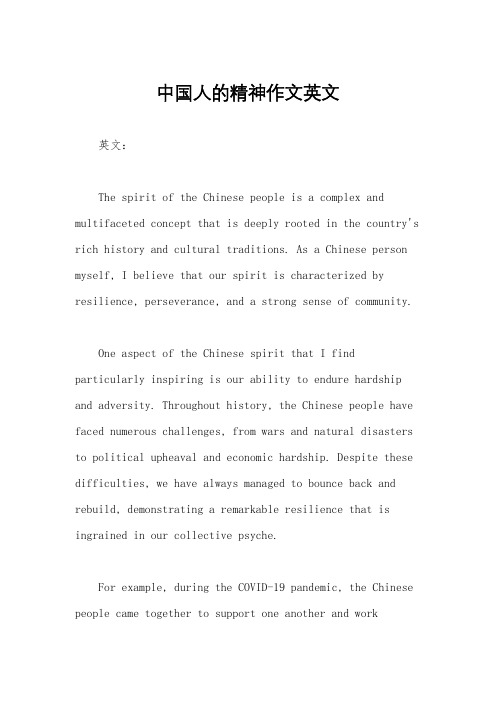
中国人的精神作文英文英文:The spirit of the Chinese people is a complex and multifaceted concept that is deeply rooted in the country's rich history and cultural traditions. As a Chinese person myself, I believe that our spirit is characterized by resilience, perseverance, and a strong sense of community.One aspect of the Chinese spirit that I findparticularly inspiring is our ability to endure hardship and adversity. Throughout history, the Chinese people have faced numerous challenges, from wars and natural disasters to political upheaval and economic hardship. Despite these difficulties, we have always managed to bounce back and rebuild, demonstrating a remarkable resilience that is ingrained in our collective psyche.For example, during the COVID-19 pandemic, the Chinese people came together to support one another and worktowards a common goal of containing the virus. This sense of unity and solidarity is a testament to the strength of our community spirit, which has helped us overcome countless obstacles throughout the centuries.Another defining characteristic of the Chinese spiritis our unwavering perseverance in the face of obstacles. We are known for our strong work ethic and determination to succeed, even in the face of daunting challenges. This can be seen in the countless stories of individuals who have overcome poverty and adversity to achieve great success, embodying the proverb "坚持就是胜利" (jiānchí jiùshìshènglì), which means "persistence leads to victory."Furthermore, the Chinese spirit is deeply rooted in our cultural traditions and values, such as filial piety, respect for elders, and a strong emphasis on education. These core principles have helped shape our collective identity and guide our actions, serving as a moral compass that has stood the test of time.中文:中国人的精神是一个复杂而多面的概念,深深扎根于这个国家丰富的历史和文化传统之中。
经典英文赏析中国人的精神(课堂PPT)
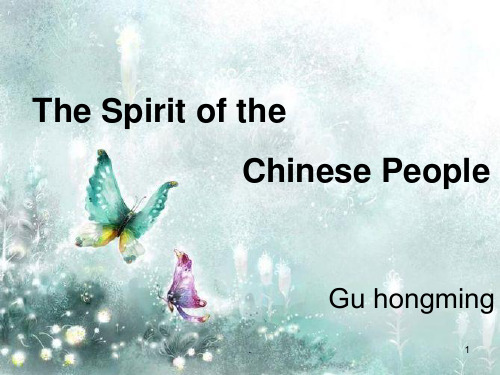
poem? It is because you want to
learn English, our Chinese
personhood's truth, placid poetry
education, to explain to the free
state." At that time, he is defiant,
worked in the colonial Singa-
pore government for some
time .
.
2
辜鸿铭(1857-1928)出生在 马来西亚,槟城。他是一个 橡胶种植园负责人和一个 葡萄牙女孩结婚所生的第 二个孩子。他的家乡是中 国福建惠安。他10岁的时 候被带到苏格兰学习。在 欧洲学习期间,获得英国爱 丁堡大学的文学学士学位, 同时,他在巴黎学习法律。 毕业后,他在新加坡殖民政 府工作了一段时间。
of a man and a woman". He criticized
those who" is called the Chinese
Civilization Research Authority"
missionaries and Sinologists" do not
actually know Chinese and Chinese
辜鸿铭认为,要估价一种文明,必须看它“能够
生产什么样子的人,什么样的男人和女人”。他
批评那些“被称作中国文明研究权威”的传教士
和汉学家们“实际上并不真正懂得中国人和中国
语言”。他独到地指出:“要懂得真正的中国人
和中国文明,那个人必须是深沉的、博大的和纯
中国人的精神的主题英文概括
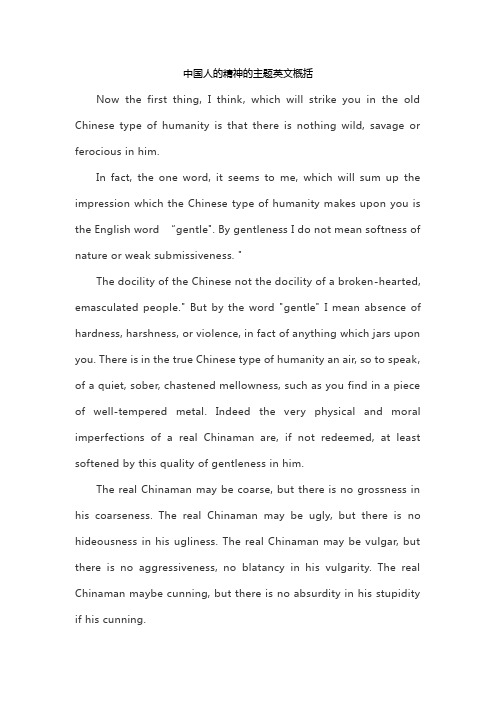
中国人的精神的主题英文概括Now the first thing, I think, which will strike you in the old Chinese type of humanity is that there is nothing wild, savage or ferocious in him.In fact, the one word, it seems to me, which will sum up the impression which the Chinese type of humanity makes upon you is the English word “gentle". By gentleness I do not mean softness of nature or weak submissiveness. "The docility of the Chinese not the docility of a broken-hearted, emasculated people." But by the word "gentle" I mean absence of hardness, harshness, or violence, in fact of anything which jars upon you. There is in the true Chinese type of humanity an air, so to speak, of a quiet, sober, chastened mellowness, such as you find in a piece of well-tempered metal. Indeed the very physical and moral imperfections of a real Chinaman are, if not redeemed, at least softened by this quality of gentleness in him.The real Chinaman may be coarse, but there is no grossness in his coarseness. The real Chinaman may be ugly, but there is no hideousness in his ugliness. The real Chinaman may be vulgar, but there is no aggressiveness, no blatancy in his vulgarity. The real Chinaman maybe cunning, but there is no absurdity in his stupidity if his cunning.In fact what I want to say is, that even in the faults and blemishes of body, mind and character of the real Chinaman, there is nothing which revolts you. It’s seldom that you will find a real Chinaman of the old school, even of the lowest type, who is positively repulsive.。
中国人精神演讲英文作文
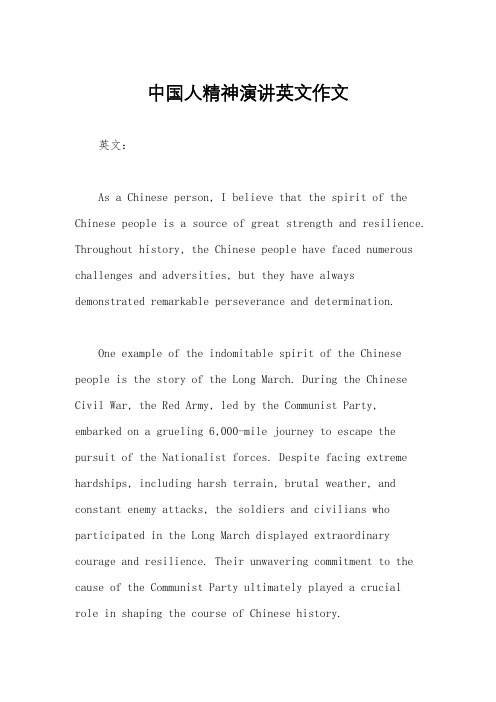
中国人精神演讲英文作文英文:As a Chinese person, I believe that the spirit of the Chinese people is a source of great strength and resilience. Throughout history, the Chinese people have faced numerous challenges and adversities, but they have always demonstrated remarkable perseverance and determination.One example of the indomitable spirit of the Chinese people is the story of the Long March. During the Chinese Civil War, the Red Army, led by the Communist Party, embarked on a grueling 6,000-mile journey to escape the pursuit of the Nationalist forces. Despite facing extreme hardships, including harsh terrain, brutal weather, and constant enemy attacks, the soldiers and civilians who participated in the Long March displayed extraordinary courage and resilience. Their unwavering commitment to the cause of the Communist Party ultimately played a crucialrole in shaping the course of Chinese history.Another example of the Chinese spirit can be found inthe remarkable economic transformation that has taken place in China over the past few decades. Despite starting from a position of poverty and underdevelopment, the Chinesepeople have worked tirelessly to build a modern and prosperous nation. The rapid economic growth and development that China has experienced is a testament tothe hard work, determination, and innovative spirit of the Chinese people.中文:作为一个中国人,我相信中国人的精神是一种巨大的力量和韧性的源泉。
中国人精神英文作文
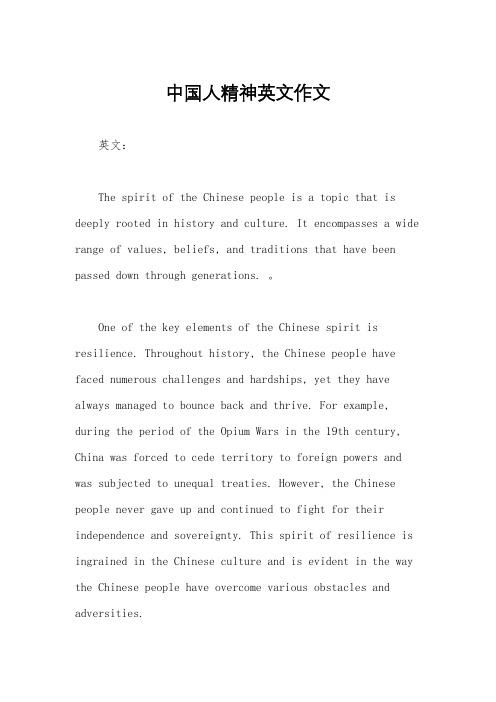
中国人精神英文作文英文:The spirit of the Chinese people is a topic that is deeply rooted in history and culture. It encompasses a wide range of values, beliefs, and traditions that have been passed down through generations. 。
One of the key elements of the Chinese spirit is resilience. Throughout history, the Chinese people have faced numerous challenges and hardships, yet they have always managed to bounce back and thrive. For example, during the period of the Opium Wars in the 19th century, China was forced to cede territory to foreign powers and was subjected to unequal treaties. However, the Chinese people never gave up and continued to fight for their independence and sovereignty. This spirit of resilience is ingrained in the Chinese culture and is evident in the way the Chinese people have overcome various obstacles and adversities.Another important aspect of the Chinese spirit is the value of harmony. In Chinese philosophy, the concept of harmony is central to the way individuals interact with each other and with the natural world. This can be seen in the traditional Chinese belief in the balance of yin and yang, as well as in the emphasis on maintaining harmonious relationships within the family and society. For example, the Chinese New Year is a time for families to come together and celebrate, reinforcing the importance of unity and togetherness.Furthermore, the Chinese spirit is characterized by a strong sense of community and mutual support. The concept of guanxi, or social connections, plays a crucial role in Chinese society, where relationships and networks are highly valued. This can be observed in various aspects of Chinese life, such as in business dealings, where personal connections often play a significant role in decision-making processes.In addition, the Chinese spirit is deeply rooted in asense of filial piety and respect for elders. The Confucian value of xiao, or filial piety, emphasizes the importance of honoring and caring for one's parents and ancestors. This value is reflected in the way Chinese families prioritize the well-being of their elders and seek to maintain strong family bonds.中文:中国人的精神是一个根植于历史和文化的主题。
英语专业英语课外阅读推荐书目

91. Beijing Review 《北京周报》
74.《英汉应用文手册》傅似逸编著,北京大学出版社
75.《英语初级口语》吴侦福主编,外语教学与研究出版社(教材)
76.《英语中级口语》吴侦福主编,外语教学与研究出版社(教材)
77.《英语高级口语》吴侦福主编,外语教学与研究出版社(教材)
78.《新概念英语》(1-4册)(建议学生背诵部分文章)
79.《牛津书虫系列》(共50本),外语教学与研究出版社
六、英语专业英语课外阅读推荐书目
(本推荐书目不包括《高等学校英语专业英语教学大纲》第28页-32页所列的
阅读参考书目)
1.Dream of Red Mansions(Translated by Yang Hsien-Yi & Gladys),Foreign Languages Press
2.Women in World History——Soong Ching Ling (by lsrael Epstein),New World Press
85.刘重德 《文学翻译十讲》 北京 中国对外翻译出版社 1991
86.许渊冲《唐宋词一百首》北京 中国对外翻译出版社 1990
87.郭著章 《翻译名家研究》 湖北教育出版社 1999
88.美国国际短篇小说选入选中国作品:《沙狐》(汉英对照),外语教学与研究出版社
89. 王佐良 刘承沛 编选 《美国短篇小说选》 商务印书馆 1986
3.A Complete Guide to Xiamen(by Liu Yuchang),厦门大学出版社
中国人的精神作文英文版
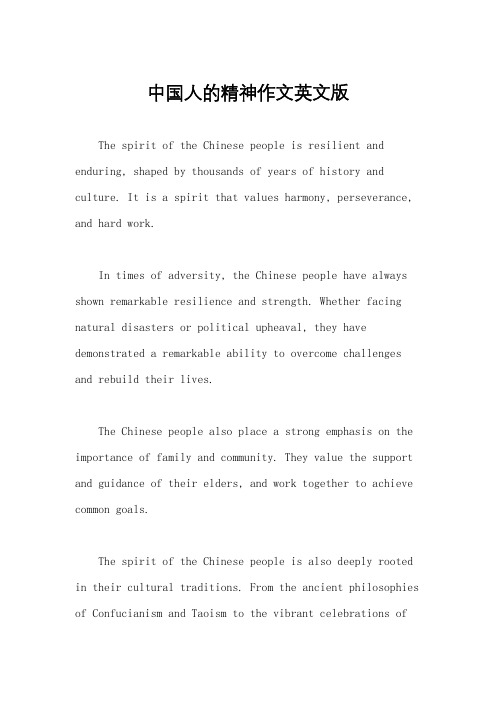
中国人的精神作文英文版The spirit of the Chinese people is resilient and enduring, shaped by thousands of years of history and culture. It is a spirit that values harmony, perseverance, and hard work.In times of adversity, the Chinese people have always shown remarkable resilience and strength. Whether facing natural disasters or political upheaval, they have demonstrated a remarkable ability to overcome challenges and rebuild their lives.The Chinese people also place a strong emphasis on the importance of family and community. They value the support and guidance of their elders, and work together to achieve common goals.The spirit of the Chinese people is also deeply rooted in their cultural traditions. From the ancient philosophies of Confucianism and Taoism to the vibrant celebrations ofChinese New Year, these traditions continue to shape the values and beliefs of the Chinese people.In recent years, the spirit of the Chinese people has been evident in their rapid economic development and technological innovation. They have shown a remarkable ability to adapt to change and embrace new opportunities.Despite the challenges they may face, the Chinese people remain optimistic and determined. They continue to strive for a better future, drawing strength from theirrich cultural heritage and the enduring spirit that defines them.。
中国人的精神作文英文翻译
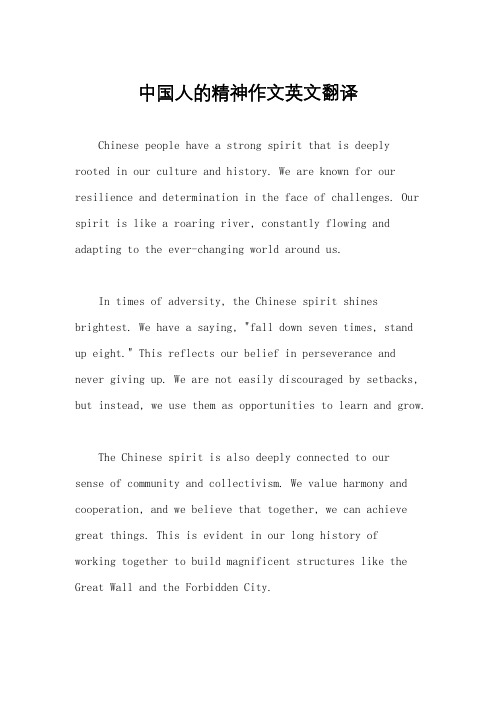
中国人的精神作文英文翻译Chinese people have a strong spirit that is deeply rooted in our culture and history. We are known for our resilience and determination in the face of challenges. Our spirit is like a roaring river, constantly flowing and adapting to the ever-changing world around us.In times of adversity, the Chinese spirit shines brightest. We have a saying, "fall down seven times, stand up eight." This reflects our belief in perseverance and never giving up. We are not easily discouraged by setbacks, but instead, we use them as opportunities to learn and grow.The Chinese spirit is also deeply connected to oursense of community and collectivism. We value harmony and cooperation, and we believe that together, we can achieve great things. This is evident in our long history ofworking together to build magnificent structures like the Great Wall and the Forbidden City.Another aspect of the Chinese spirit is our reverencefor tradition and our ancestors. We hold onto our cultural heritage tightly, passing down ancient customs and rituals from generation to generation. This connection to our past gives us a sense of identity and belonging, and it strengthens our resolve to preserve our traditions in the face of modernization.Chinese people are also known for their strong work ethic. We believe in the value of hard work and dedication, and we are willing to put in the effort to achieve our goals. This is reflected in our rapid economic development and our ability to adapt to new technologies and industries.The Chinese spirit is not just limited to our own country. Chinese people have a strong sense of global citizenship and are actively involved in international affairs. We strive to contribute to the world and make a positive impact, whether through economic cooperation, cultural exchange, or humanitarian aid.In conclusion, the Chinese spirit is a powerful forcethat drives us forward in the face of challenges. It is a combination of resilience, collectivism, tradition, hard work, and global citizenship. This spirit is what has enabled us to overcome countless obstacles throughout history and will continue to propel us towards a brighter future.。
中国人的精神作文英文
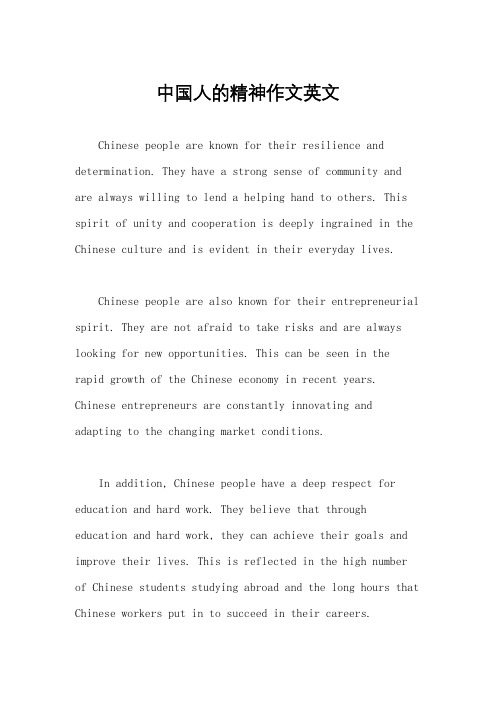
中国人的精神作文英文Chinese people are known for their resilience and determination. They have a strong sense of community and are always willing to lend a helping hand to others. This spirit of unity and cooperation is deeply ingrained in the Chinese culture and is evident in their everyday lives.Chinese people are also known for their entrepreneurial spirit. They are not afraid to take risks and are always looking for new opportunities. This can be seen in the rapid growth of the Chinese economy in recent years. Chinese entrepreneurs are constantly innovating and adapting to the changing market conditions.In addition, Chinese people have a deep respect for education and hard work. They believe that through education and hard work, they can achieve their goals and improve their lives. This is reflected in the high number of Chinese students studying abroad and the long hours that Chinese workers put in to succeed in their careers.Another characteristic of Chinese people is theirstrong sense of tradition and history. They take pride in their cultural heritage and are always looking for ways to preserve and promote it. This can be seen in the numerous festivals and celebrations that take place throughout the year, where Chinese people come together to honor their traditions and customs.Chinese people also value harmony and balance in their lives. They strive to maintain a harmonious relationshipwith nature and believe in the concept of yin and yang.This can be seen in practices such as tai chi and feng shui, which aim to create balance and harmony in one's surroundings.Lastly, Chinese people have a strong sense ofpatriotism and love for their country. They take pride in China's rich history and cultural heritage and are always eager to contribute to its development and progress. This can be seen in the numerous social and economic initiatives that Chinese people undertake to improve their communitiesand the country as a whole.In conclusion, the spirit of the Chinese people can be characterized by their resilience, entrepreneurialism, respect for education and hard work, strong sense of tradition, value for harmony and balance, and love for their country. These characteristics shape their everyday lives and contribute to the overall progress and development of China.。
论中国人的精神英文作文
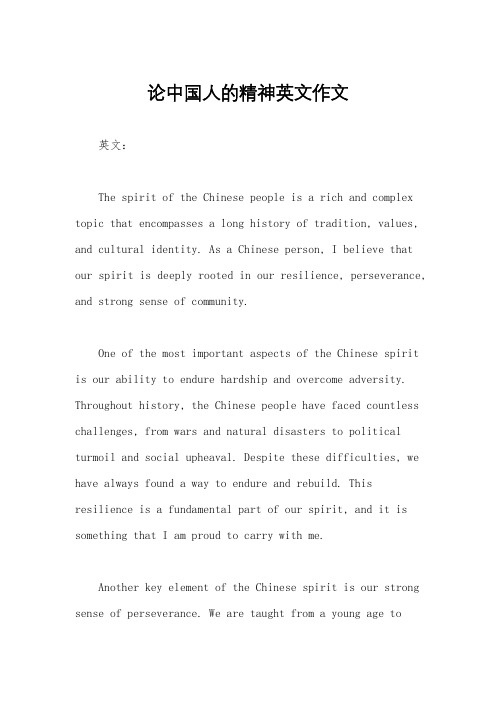
论中国人的精神英文作文英文:The spirit of the Chinese people is a rich and complex topic that encompasses a long history of tradition, values, and cultural identity. As a Chinese person, I believe that our spirit is deeply rooted in our resilience, perseverance, and strong sense of community.One of the most important aspects of the Chinese spirit is our ability to endure hardship and overcome adversity. Throughout history, the Chinese people have faced countless challenges, from wars and natural disasters to political turmoil and social upheaval. Despite these difficulties, we have always found a way to endure and rebuild. This resilience is a fundamental part of our spirit, and it is something that I am proud to carry with me.Another key element of the Chinese spirit is our strong sense of perseverance. We are taught from a young age towork hard and never give up, no matter how difficult the circumstances may be. This determination and perseverance have allowed the Chinese people to achieve great things, from building the Great Wall to launching successful businesses and thriving in various fields around the world.In addition to resilience and perseverance, the Chinese spirit is also deeply rooted in our sense of community and family. We place a strong emphasis on the well-being of our loved ones and the importance of maintaining strong relationships with our relatives and friends. This sense of community extends beyond our immediate family and friends to encompass our larger community and even our nation as a whole. We value unity and cooperation, and we believe in working together to achieve common goals.Overall, the spirit of the Chinese people is a complex tapestry of resilience, perseverance, and community. It is a spirit that has been shaped by our history, culture, and traditions, and it is something that continues to inspire and guide us in our daily lives.中文:中国人的精神是一个丰富而复杂的话题,涵盖了悠久的传统、价值观和文化认同。
中国人的精神作文英文版
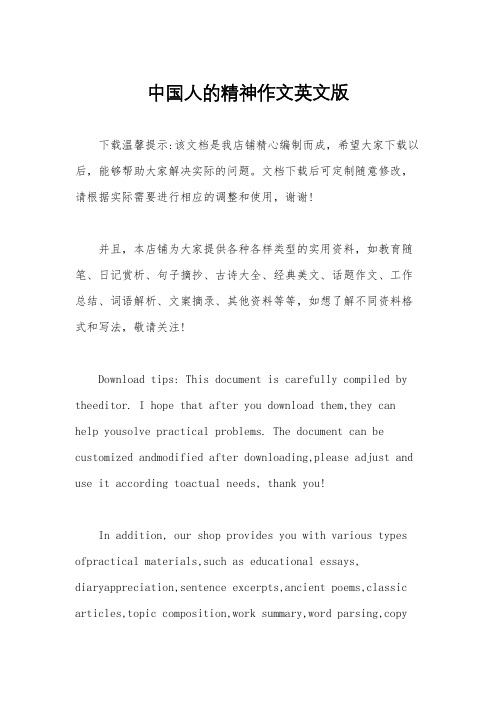
中国人的精神作文英文版下载温馨提示:该文档是我店铺精心编制而成,希望大家下载以后,能够帮助大家解决实际的问题。
文档下载后可定制随意修改,请根据实际需要进行相应的调整和使用,谢谢!并且,本店铺为大家提供各种各样类型的实用资料,如教育随笔、日记赏析、句子摘抄、古诗大全、经典美文、话题作文、工作总结、词语解析、文案摘录、其他资料等等,如想了解不同资料格式和写法,敬请关注!Download tips: This document is carefully compiled by theeditor. I hope that after you download them,they can help yousolve practical problems. The document can be customized andmodified after downloading,please adjust and use it according toactual needs, thank you!In addition, our shop provides you with various types ofpractical materials,such as educational essays, diaryappreciation,sentence excerpts,ancient poems,classic articles,topic composition,work summary,word parsing,copyexcerpts,other materials and so on,want to know different data formats andwriting methods,please pay attention!In China, the spirit of the people is vibrant and resilient. It is a spirit that embodies determination, perseverance, and a strong sense of community. It is aspirit that has been shaped by the country's rich history and diverse culture.The Chinese people have a deep-rooted sense of perseverance. They have faced countless challenges throughout history, from wars and natural disasters to economic hardships. Yet, they have always found a way to overcome these obstacles and emerge stronger than before. This spirit of perseverance is evident in the Chinese proverb, "Fall down seven times, stand up eight." It reflects the belief that no matter how many times one may fail, they must always find the strength to get back up and keep moving forward.The Chinese people also value the importance of community. They understand that they are stronger togetherthan they are alone. This is evident in the concept of "guanxi," which refers to the network of relationships and connections that individuals cultivate throughout their lives. These connections are not only important for personal success, but also for the betterment of society as a whole. The Chinese people believe in the power of collective effort and collaboration.Another aspect of the Chinese spirit is adaptability. The Chinese people have a long history of adapting to changing circumstances and embracing new ideas and technologies. This adaptability is evident in the country's rapid economic development and technological advancements. The Chinese people are not afraid to try new things and take risks in order to achieve their goals. They are constantly seeking innovative solutions to problems and are willing to learn from their mistakes.The Chinese spirit is also deeply rooted in a sense of cultural identity. China has a rich and diverse culturethat spans thousands of years. From traditional arts and crafts to ancient philosophies and spiritual beliefs, theChinese people take pride in their cultural heritage. This cultural identity is reflected in the Chinese value of "harmony," which emphasizes the importance of maintaining balance and unity in all aspects of life.In conclusion, the spirit of the Chinese people is characterized by perseverance, community, adaptability, and cultural identity. It is a spirit that has been shaped by the country's history and culture, and it continues to shape the lives of the Chinese people today. This spirit is what drives the Chinese people to overcome challenges, support each other, embrace change, and celebrate their unique cultural heritage.。
“中国人的精神”节选
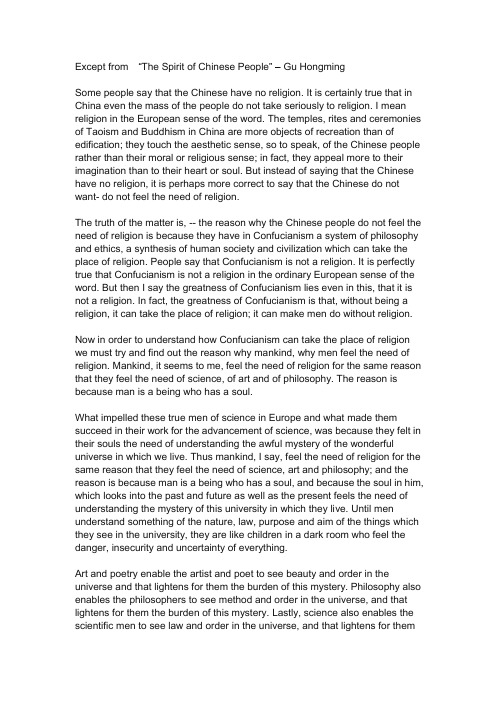
Except from “The Spirit of Chinese People”– Gu HongmingSome people say that the Chinese have no religion. It is certainly true that in China even the mass of the people do not take seriously to religion. I mean religion in the European sense of the word. The temples, rites and ceremonies of Taoism and Buddhism in China are more objects of recreation than of edification; they touch the aesthetic sense, so to speak, of the Chinese people rather than their moral or religious sense; in fact, they appeal more to their imagination than to their heart or soul. But instead of saying that the Chinese have no religion, it is perhaps more correct to say that the Chinese do not want- do not feel the need of religion.The truth of the matter is, -- the reason why the Chinese people do not feel the need of religion is because they have in Confucianism a system of philosophy and ethics, a synthesis of human society and civilization which can take the place of religion. People say that Confucianism is not a religion. It is perfectly true that Confucianism is not a religion in the ordinary European sense of the word. But then I say the greatness of Confucianism lies even in this, that it is not a religion. In fact, the greatness of Confucianism is that, without being a religion, it can take the place of religion; it can make men do without religion.Now in order to understand how Confucianism can take the place of religion we must try and find out the reason why mankind, why men feel the need of religion. Mankind, it seems to me, feel the need of religion for the same reason that they feel the need of science, of art and of philosophy. The reason is because man is a being who has a soul.What impelled these true men of science in Europe and what made them succeed in their work for the advancement of science, was because they felt in their souls the need of understanding the awful mystery of the wonderful universe in which we live. Thus mankind, I say, feel the need of religion for the same reason that they feel the need of science, art and philosophy; and the reason is because man is a being who has a soul, and because the soul in him, which looks into the past and future as well as the present feels the need of understanding the mystery of this university in which they live. Until men understand something of the nature, law, purpose and aim of the things which they see in the university, they are like children in a dark room who feel the danger, insecurity and uncertainty of everything.Art and poetry enable the artist and poet to see beauty and order in the universe and that lightens for them the burden of this mystery. Philosophy also enables the philosophers to see method and order in the universe, and that lightens for them the burden of this mystery. Lastly, science also enables the scientific men to see law and order in the universe, and that lightens for themthe burden of this mystery. But for the mass of mankind who are not poets, artists, philosophers or men of science; for the mass of mankind whose lives are full of hardships and who are exposed every moment to the shock of accident from the threatening forces of Nature and the cruel merciless passions of their fellow-men, what is it that can lighten for them the "burden of the mystery of all this unintelligible world?" It is religion. Religion, I say, lightens this burden by giving the mass of mankind a sense of security and a sense of permanence. Christ said:" Peace I give unto you, peace which the world cannot give and which the world cannot take away from you." This is what I mean when I say that religion gives to the mass of mankind a sense of security and a sense of permanence. Therefore, unless you can find something which can give to the mass of mankind the same peace, the same sense of security and of permanence which religion affords them, the mass of mankind will always feel the need of religion.In short, a religion in the European sense of the word makes it its object to transform man into a perfect ideal man by himself, into a saint, a Buddha, an angel, whereas Confucianism limits itself to make man into a good citizen--to live as a dutiful son and a good citizen. In other words, a religion in the European sense of the word says:-"If you want to have religion, you must be a saint, a Buddha, an angel;" whereas Confucianism says:--"If you live as a dutiful son and a good citizen, you 'have' religion." In fact, the real difference between Confucianism and religion in the European sense of the word, such as Christianity or Buddhism, is that the one is a personal religion, or what may be called a Church religion, whereas the other is a social religion, or what may be called a State religion. In Europe politics is a science, but in China, since Confucius time, politics is a religion. In short, the greatest service which Confucius has done for the Chinese nation, I say, is that he gave them a Social or State religion.(899 words)。
- 1、下载文档前请自行甄别文档内容的完整性,平台不提供额外的编辑、内容补充、找答案等附加服务。
- 2、"仅部分预览"的文档,不可在线预览部分如存在完整性等问题,可反馈申请退款(可完整预览的文档不适用该条件!)。
- 3、如文档侵犯您的权益,请联系客服反馈,我们会尽快为您处理(人工客服工作时间:9:00-18:30)。
中国人的精神辜鸿铭INTRODUCTIONThe Religion of Good-citizenshipSage, thun ivir nicht rechtl Wir mussen den Pobel betrugen,Scih nur, ivie ungeschickt, sich nur ivie wild er sich zeigt\ Ungeschick und wild sind alle rohen Betrogenen ;Seid nur redlich und fiihrt ihn zum Menschlichen an.GoetheTHE great war at the present moment is absorbing all the attention of the world exclusive of everything else. But then I think this war itself must make serious thinking people turn their attention to the great problem of civilisation. All civilisation begins by the conquest of Nature, i.e. by subduing and controlling the terrific physical forces in Nature so that they can do no harm to men. The modern civilisation of Europe to-day has succeeded in the conquest of Nature with a success, it must be admitted, hitherto not attained by any other civilisation. But there is in this world a force more terrible even than the terrific physical forces in Nature and that is the passions in the heart of man. The harm which the physical forces of Nature can do to mankind, is nothing compared with the harm which human passions can do. Until therefore this terrible force,_the human passions_is properly regulated and controlled, there can be, it is evident, not only no civilisation, but even no life possible for human beings.In the first early and rude stage of society, mankind had to use_ Aren't we just doing the right thing? the mob we must befool them;See, now, how shiftless! and look now how wild! {or such is the mob-Shiftless and wild all sons of Adam are when you befool them;Be but honest and true, and thus make human, them all.physical force to subdue and subjugate human passions. Thus hordes of savages had to be subjugated by sheer physical force. But as civilisation advances, mankind discovers a force more potent and more effective for subduing and controlling human passions than physical force and this force is called moral force. The moral force which in the past has been effective in subduing and controlling the human passions in the population of Europe, is Christianity. But now this war with the armament preceding it, seems to show that Christianity has become ineffective as a moral force. Without an effective moral force to control and restrain human passions, the people ofEurope have had again to employ physical force to keep civil order. As Car-lyle truly says, " Europe is Anarchy plus a constable. " The use of physical force to maintain civil order leads to militarism. In fact militarism is necessary in Europe to-day because of the want of an effective moral force. But militarism leads to war and war means destruction and waste. Thus the people of Europe are on the horns of a dilemma. If they do away with militarism, anarchy will destroy their civilisation, but if they keep up militarism, their civilisation will collapse through the waste and destruction of war. But Englishmen say that they are determined to put down Prussian militarism and Lord Kitchner believes that he will be able to stamp out Prussian militarism with three million drilled and armed Englishmen. But then it seems to me when Prussian militarism is thus stamped out, there will then arise another militarism, _the British militarism which again will have to be stamped out. Thus there seems to be no way of escape out of this vicious circle.But is there really no way of escape? Yes, I believe there is. The American Emerson long ago said, "I can easily see the bankruptcy of the vulgar musket worship, _though great men be musket worshippers; and 'tis certain, as God liveth, the gun that does need another gun, the law of love and justice alone can effect a clean revolution." Now if the people of Europe really want to put down militarism, there is only one way of doing it and that is, to use what E-merson calls the gun that does not need another gun, the law of love and justice, _in fact, moral force, With an effective moral force, militarism will become unnecesary and disappear of itself. But now, that Christianity has become ineffective as a moral force the problem is where are the people of Europe to find this new effective moral force which will make militarism unnecessary?I believe the people of Europe will find this new moral force in China, _in the Chinese civilisation. The moral force in the Chinese civilisation which can make militarism unnecessary is the Religion of good citizenship. But people will say to me, "There have also been wars in China. " It is true there have been wars in China; but, since the time of Confucius ,years ago, we Chinese have had no militarism such as that we see in Europe to-day. In China war is an accident, whereas in Europe war has become a necessity. We Chinese are liable to have wars, but we do not live in constant expectation of war. In fact the one thing intolerable in the state of Europe, it seems to me, is not so much war as the fact that every body is constantly afraid that his neighbour as soon as he gets strong enough to be able to do it, will come to rob and murder him and he has therefore to arm himself or pay for an armed policeman to protect him. Thus what weighs upon the people of Europe is not so much the accident of War, but the constant necessity to arm themselves, the absolute nec-cessity to use physical force to protect themselves.Now in China because we Chinese have the Religion of good citizenship a man does not feel the need of using physical force to protect himself; he has seldom the need even to call in and use the physical force of the policeman, of the State to protect him. A man in China is protected by the sense of justice of his neighbour; he is protected by the readiness of his fellow men to obey the sense of moral obligation. In fact, a man in China does not feel the need of using physical force to protect himself because he is sure that right and justice is recognised by every body as a force higher than physical force and moral obligation is recognised by every body as something which must be obeyed. Now if you can get all mankind to agree to recognise right and justice, as a force higher than physical force, and moral obligation as something which must be obeyed, then the useof physical force will become unnecessary; then there will be no militarism in the world. But of course there will be in every country a few people, criminals, and in the world, a few savages who will not or are not able to recognise right and justice as a force higher than physical force and moral obligation as something which must be obeyed. Thus a-gainst criminals and savages a certain amount of physical or police force and militarism will always be necessary in every country and in the world.But people will say to me how are you to make mankind recognise right and justice as a force higher than physical force. I answer the first thing you will have to do is to convince mankind of the efficacy of right and justice, convince them that right and justice is a power; in fact, convince them of the power of goodness. But then a-gain how are you to do this? Well, _in order to do this, the Religion of good citizenship in China teaches every child as soon as he is able to understand the meaning of words, that the Nature of man is good. *Now the fundamental unsoundness of the civilisation of Europe to-day, it seems to me, lies in its wrong conception of human nature;its conception that human nature is evil and because of this wrong conception, the whole structure of society in Europe has always rested upon force. The two things which the people of Europe have depended upon to maintain civil order are Religion and Law. In other words, the population of Europe have been kept in order by the fear of God and the fear of the Law. Fear implies the use of force. Therefore in order to keep up the fear of God, the people of Europe had at first to maintain a large number of expensive idle persons called priests. That, to speak of nothing else, meant so much expense, that it at last became an unbearable burden upon the people. In fact in the thirty years war of the Reformation, the people of Europe tried to get rid of the priest. After having got rid of the priests who kept the population in order by the fear of God, the people of Europe tried to maintain civil order by the fear of the Law. But to keep up the fear of the Law, the people of Europe have had to maintain another class of still more expensive idle persons called policemen and soldiers. Now the people of Europe are beginning to find out that the main-tainence of policemen and soldiers to keep civil order, is still more ruinously expensive than even the maintainence of priests. In fact, as in the thirty years war of the Reformation, the people of Europe wanted to get rid of the priest, so in this present war, what the people of Europe really want, is to get rid of the soldier. But the alternatives before the people of Europe if they want to get rid of the policeman and soldier, is either to call back the priest to keep up the fear of God or to find something else which, like the fear of God and the fear of the Law, will help them to maintain civil order. That, to put the question broadly, I think, everybody will admit, is the great problem of civilisation before the people of Europe after this war.Now after the experience which they have had with the priests, I do not think the people of Europe will want to call back the priests. Bismarck has said, "We will never go back to Canossa." Besides, even if the priests are now called back, they would be useless, for the fear of God is gone from the people of Europe. The only other alternative before the people of Europe therefore, if they want to get rid of the policeman and soldier, is to find something else, which, like the fear of God and the fear of the Law, can help them to maintain civil order. Now this something, I believe, as I havesaid, the people of Europe will find in the Chinese civilisation. This something is what I have called the Religion of good citizenship. This Religion of good citizenship in China is a religion which can keep the population of a country in order without priest and without policeman or soldier. In fact with this Religion of good citizenship, the population of , China, a population as large, if not larger than the whole population r of the Continent of Europe, are actually and practically kept in peace and order without priest and without policeman or soldier. In China, as every one who has been in this country knows, the priest and the , policeman or soldier, play a very subordinate, a very insignificant ( part in helping to maintain public order. Only the most ignorant class in China require the priest and only the worst, .the criminal class in China, require the policeman or soldier to keep them in order. Thus I say if the people of Europe really want to get rid of Religion and Militarism, of the priest and soldier which have caused them so much trouble and bloodshed, they will have to come to China to get this, what I have called the Religion of good citizenship.In short what I want to call the attention of the people of Europe and America to, just at this moment when civilisation seems to be threatened with bankruptcy, is that there is an invaluable and hitherto unsuspected asset of civilisation here in China. The asset of civilisation is not the trade, the railway, the mineral wealth, gold, silver, iron or coal in this country. The asset of civilisation of the world today, I want to say here, is the Chinaman,_the unspoilt real Chinaman with his Religion of good citizenship. The real Chinaman, I say, is an invaluable asset of civilisation, because he is a person who costs the world little or nothing to keep him in order. Indeed I would likehere to warn the people of Europe and America not to destroy this invaluable asset of civilisation, not to change and spoil the real Chinaman as they are now trying to do with their New Learning. If the people of Europe and America succeed in destroying the real Chinaman, the Chinese type of humanity; succeed in transforming the real Chinaman into a European or American, i.e., to say, a person who will require a priest or soldier to keep him in order, then surely they will increase the burden either of Religion or of Militarism of the world, _this last item at this moment already becoming a danger and menace to civilisation and humanity. But on the other hand, suppose one could by some means or other change the European or American type of humanity, transform the European or American into a real Chinaman who will then not require a priest or soldier to keep him in order,;_just think what a burden will be taken off from the world.But now to sum up in a few plain words the great problem of civilisation in Europe arising out of this war. The people of Europe, I say, at first tried to maintain civil order by the help of the priest. But after a while, the priest cost too much expense and trouble. The people of Europe then, after the thirty years war, sent away the priest and called in the policeman and soldier to maintain civil order. But now they find the policeman and soldier are causing more expense and trouble even than the priests. Now what are the people of Europe to do? Send away the soldier and call back the priest? No, I do not believe the people of Europe will want to call back the priest. Besides the priest now would be useless. But then what are the people of Europe to do? I see Professor Lowes Dickinson of Cambridge in an article in the Atlantic Monthly, entitled "The War and the Way out, " says: "Call in the mob." I am afraid the mob when once called in to take the place of the priestand soldier, will give more trouble than even the priest and the soldier. The priests and soldiers in Europe have caused wars, but the mob will bring revolution and anarchy and then the state of Europe will be worse than before. Now my advice to the people of Europe is: Do not call back the priest, and for goodness sake don't call in the mob, _but call in the Chinaman; call in the real Chinaman with his Religion of good citizenship and his experience of ,years how to live in peace without priest and without soldier.In fact I really believe that the people of Europe will find the solution of the great problem of civilisation after this war, _here in China. There is, I say here again, an invaluable, but hitherto unsuspected asset of civilisation here in China, and the asset of civilisation is the real Chinaman. The real Chinaman is an asset of civilisation because he has the secret of a new civilisation which the people of Europe will want after this great war, and the secret of that new civilisation is what I have called the Religion of good citizenship. The first principle of this Religion of good citizenship is to believe that the Nature of Man is good; to believe in the power of goodness; to believe in the power and efficacy of what the American Emerson calls the law of love and justice. But what is the law of love? The Religion of good citizenship teaches that the law of love means to love your father and mother. And what is the law of justice? The Religion of good citizenship teaches that the law of justice means to be true, to be faithful, to be loyal; that the woman in every country must be self-lessly, absolutely loyal to her husband, that the man in every country must be selflessly, absolutely loyal to his sovereign, to his King or Emperor. In fact the highest duty in this Religion of good citizenship I want to say finally here is the Duty of Loyalty, loyalty not only in deed, but loyalty in spirit or as Tennyson puts it,To reverence the King as he wereTheir conscience and their conscience as their King,To break the heathen and uphold the Christ.THE SPIRIT OF THE CHINESE PEOPLEA Paper that was to have been read before the Oriental Society of PekingLET me first of all explain to you what I propose, with your permission, this afternoon to discuss. The subject of our paper I have called "The Spirit of the Chinese people."! do not mean here merely to speak of the character or characteristics of the Chinese people. Chinese characteristics have often been described before, but I think you will agree with me that such description or enumeration of the characteristics of the Chinese people hitherto have given us no picture at all of the inner being of the Chinaman. Besides, when we speak of the character or characteristics of the Chinese, it is not possible to generalize. The character of the Northern Chinese, as you know, is as different from that of the Southern Chinese as the character of the Germans is different from that of the Italians.But what I mean by the spirit of the Chinese people, is the spirit by which the Chinese people live,something constitutionally distinctive in the mind, temper and sentiment of the Chinese people which distinguishes them from all other people, especially from those of modem Europe and America. Perhaps I can best express what I mean by calling the subject of our discussion the Chinese type of humanity, or, to put it in plainer and shorter words, the real Chinaman.Now, what is the real Chinaman? That, I am sure, you will all agree with me, is a very interesting subject, especially at the present moment, when from what we see going on around us in China today, it would seem that the Chinese type of humanity_the real Chinaman_is going to disappear and, in his place, we are going to have a new type of humanity_the progressive or modern Chinaman. In fact I propose that before the real Chinaman, the old Chinese type of humanity, disappears altogether from the world we should take a good last look at him and see if we can find anything organically distinctive in him which makes him so different from all other people and from the new type of humanity which we see rising up in China today.Now the first thing, I think, which will strike you in the old Chinese type of humanity is that there is nothing wild, savage or ferocious in him. Using a term which is applied to animals, we may say of the real Chinaman that he is a domesticated creature. Take a man of the lowest class of the population in China and, I think, you will agree with me that there is less of animality in him, less of the wild animal, of what the Germans call Rohheit, than you will find in a man of the same class in a European society. In fact, the one word, it seems to me, which will sum up the impression which the Chinese type of humanity makes upon you is the English word "gentle." By gentleness I do not mean softness of nature or weak submissiveness. "The docility of the Chinese," says the late Dr. D. J. Macgowan, "is not the docility of a broken-hearted, emasculated people. " But by the word " gentle" I mean absence of hardness, harshness, roughness, or violence, in fact of anything which jars upon you. There is in the true Chinese type of humanity an air, so to speak, of a quiet, sober, chastened mellowness, such as you find in a piece of well-tempered metal. Indeed the very physical and moral imperfections of a real Chinaman are, if not redeemed, at least softened by this quality of gentleness in him. The real Chinaman may be coarse, but there is no grossness in his coarseness. The real Chinaman may be ugly, but there is no hideousness in his ugliness. The real Chinaman may be vulgar, but there is no aggressiveness, no blatancy in his vulgarity. The real Chinaman may be stupid, but there is no absurdity in his stupidity. The real Chinaman may be cunning, but there is no deep malignity in his cunning. In fact what I want to say is, that even in the faults and blemishes of body, mind and character of the real Chinaman, there is nothing which revolts you. It is seldom that you will find a real Chinaman of the old school, even of the lowest type, who is positively repulsive.I say that the total impression which the Chinese type of humanity makes upon you is that he is gentle, that he is inexpressibly gentle. When you analyse this quality of inexpressible gentleness in the real Chinaman, you will find that it is the the product of a combination of two things, namely, sympathy and intelligence. I have compared the Chinese type of humanity to a domesticated animal. Now what is that which makes a domesticated animal so different from a wild animal? It is something in the domesticated animal which we recognise as distinctively human. But what is distinctively human as distinguished from what is animal? It is intelligence. But the intelligence of a domesticated animal is not a thinking intelligence. It is not an intelligence which comes to himfrom reasoning. Neither does it come to him from instinct, such as the intelligence of the fox, _ the vulpine intelligence which knows where eatable chickens are to be found. This intelligence which comes from instinct, of the fox, all,_even wild, animals have. But this, what may be called human intelligence of a domesticated animal is something quite different from the vulpine or animal intelligence. This intelligence of a domesticated animal is an intelligence which comes not from reasoning nor from instinct, but from sympathy, from a feeling of love and attachment. A thorough-bred Arab horse understands his English master not because he has studied English grammar nor because he has an instinct for the English language, but because he loves and is attached to his master. This is what I call human intelligence, as distinguished from mere vulpine or animal intelligence. It is the possession of this human quality which distinguishes domesticated from wild animals. In the same way, I say, it is the possession of this sympathetic and true human intelligence, which gives to the Chinese type of humanity, to the real Chinaman, his inexpressible gentleness.I once read somewhere a statement made by a foreigner who had lived in both countries, that the longer a foreigner lives in Japan the more he dislikes the Japanese, whereas the longer a foreigner lives in China the more he likes the Chinese. I do not know if what is said of the Japanese here, is true. But, I think, all of you who have lived in China will agree with me that what is here said of the Chinese is true. It is well-known fact that the liking_you may call it the taste for the Chinese_grows upon the foreigner the longer he lives in this country. There is an indescribable something in the Chinese people which, in spite of their want of habits of cleanliness and refinement, in spite of their many defects of mind and character, makes foreigners like them as foreigners like no other people. This indescribable something which I have defined as gentleness, softens and mitigates, if it does not redeem, the physical and moral defects of the Chinese in the hearts of foreigners. This gentleness again is, as I have tried to show you, the product of what I call sympathetic or true human intelligence_an intelligence which comes not from reasoning nor from instinct, but from sympathy_from the power of sympathy. Now what is the secret of the power of sympathy of the Chinese people?I will here venture to give you an explanation_a hypothesis, if you like to call it so_of the secret of this power of sympathy in the Chinese people and my explanation is this. The Chinese people have this power, this strong power of sympathy, because they live wholly, or almost wholly, a life of the heart. The whole life of Chinaman is a life of feeling_not feeling in the sense of sensation which comes from the bodily organs, nor feeling in the sense of passions which flow, as you would say, from the nervous system, but feeling in the sense of emotion or human affection which comes from the deepest part of our nature_the heart or soul. Indeed I may say here that the real Chinaman lives so much a life of emotion or human affection, a life of the soul, that he may be said sometimes to neglect more than he ought to do, even the necessary requirements of the life of the senses of a man living in this world composed of body and soul. That is the true explanation of the insensibility of the Chinese to the physical discomforts of unclean surroundings and want of refinement. But that is neither here nor there.The Chinese people, I say, have the power of sympathy because they live wholly a life of the heart_a life of emotion or human affection. Let me here, first of all, give you two illustrations ofwhat I mean by living a life of the heart. My first illustration is this. Some of you may have personally known an old friend and colleague of mine in Wuchang_known him when he was Minister of the Foreign Office here in Peking_Mr. Liang Tun-yen, Mr. Liang told me, when he first received the appointment of the Customs Taotai of Hankow, that what made him wish and strive to become a great mandarin, to wear the red button, and what gave him pleasure then in receiving this appointment, was not because he cared for the red button, not because he would henceforth be rich and independent, _and we were all of us very poor then in Wuchang, _but because he wanted to rejoice, because this promotion and advancement of his would gladden the heart of his old mother in Canton. That is what I mean when I say that the Chinese people live a life of the heart_a life of emotion or human affection.My other illustration is this. A Scotch friend of mine in the Customs told me he once had a Chinese servant who was a perfect scamp, who lied, who "squeezed, " and who was always gambling, but when my friend fell ill with typhoid fever in an out-of-the-way port where he had no foreign friend to attend to him, this awful scamp of a Chinese servant nursed him with a care and devotion which he could not have expected from an intimate friend or near relation. Indeed I think what was once said of a woman in the Bible may also be said, not only of the Chinese servant, but of the Chinese people generally:_"Much is forgiven them, because they love much. " The eyes and understanding of the foreigner in China see many defects and blemishes in the habits and in the character of the Chinese, but his heart is attracted to them, because the Chinese have a heart, or, as I said, live a life of the heart_a life of emotion or human affection.Now we have got, I think, a clue to the secret of sympathy in the Chinese people_the power of sympathy which gives to the real Chinaman that sympathetic or true human intelligence, making him so inexpressibly gentle. Let us next put this clue or hypothesis to the test. Let us see whether with this clue that the Chinese people live a life of the heart we can explain not only detached facts such as the two illustrations I have given above, but also general characteristics which we see in the actual life of the Chinese people.First of all let us take the Chinese language. As the Chinese live a life of the heart, the Chinese language, I say, is also a language of the heart. Now it is a well-known fact that children and uneducated persons among foreigners in China learn Chinese very easily, much more so than grown-up and educated persons. What is the reason of this? The reason, I say, is because children and uneducated persons think and speak with the language of the heart, whereas educated men, especially men with the modern intellectual education of Europe, think and speak with the language of the head or intellect. In fact, the reason why educated foreigners find it so difficult to learn Chinese, is because they are too educated, too intellectually and scientifically educated. As it is said of the Kingdom of Heaven, so it may also be said of the Chinese language:_"Unless you become as little children, you cannot learn it. "Next let us take another well-known fact in the life of the Chinese people. The Chinese, it is well-known, have wonderful memories. What is the secret of this? The secret is: the Chinese remember things with the heart and not with the head. The heart with its power of sympathy, acting as glue, can retain things much better than the head or intellect which is hard and dry. It is,。
